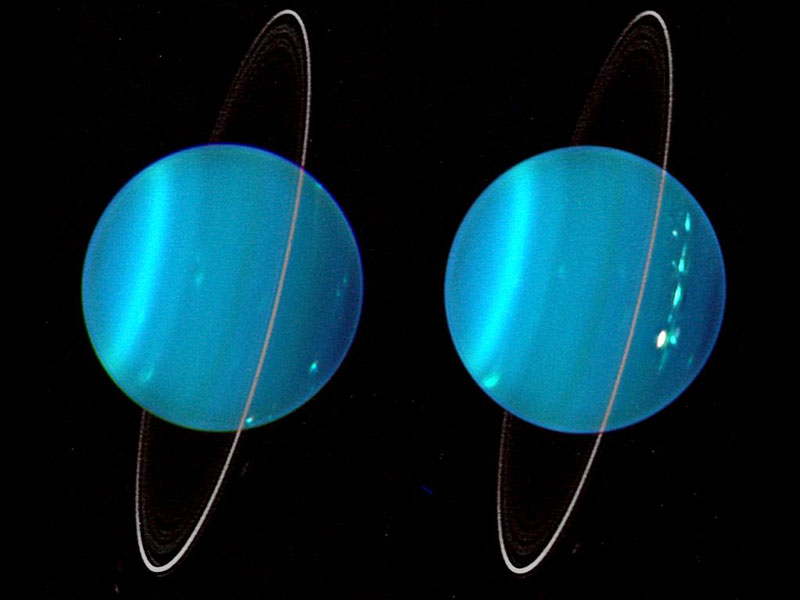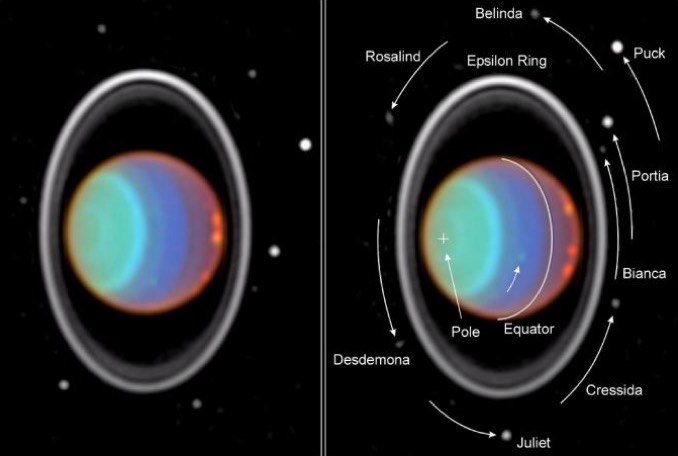A team of researchers found that Uranus was violently impacted by an object twice the size of Earth

The Sun’s seventh planet, Uranus, has long been a mystery to astronomers and scientists. This gas giant raises a myriad of questions about its formation and history due to its anomalous tendencies and peculiar properties. Recent research suggests that Uranus suffered a severe shock, which may explain its unique properties. This article explores the details of this extraordinary event and its impact on our understanding of the solar system.
Giant Pound: Unraveling Uranus’ Past in
Scientists say Uranus experienced a massive collision with an object probably twice the size of Earth, resulting in an extreme 98-degree tilt. I hypothesized that. That tremendous impact would have greatly altered the rotation of the planet, causing it to roll over. Such a violent event would have had lasting effects on the atmosphere, the planet’s internal structure, and even the magnetic field.
The Tilted World: The Effects of the Uranus Collision

The violent impact of Uranus not only turned it on its side, but left a lasting mark on the nature of the planet. This tilt affects Uranus’ weather patterns, leading to extreme seasonal variations. The planet’s magnetic field is also unique because the magnetic poles are far from the geographic poles. This unique magnetic field is thought to be the result of the cataclysms that Uranus has experienced in the past.
Moons of Uranus: Another Clue to Stomp
Uranus has 27 known moons, and their orbits provide further evidence of the planet’s violent history. Many of these satellites have unstable and highly tilted orbits, suggesting that they were severely disrupted by a large lightning event. The findings support the theory that Uranus’ unique properties are a direct result of the massive impacts it experienced.
Rare Insights into Planet Formation: Uranus as a Case Study
Giant Impact Theory sheds light on the chaotic and violent nature of planet formation. Uranus is a prime example of how catastrophic events shape and define planetary features. The study of Uranus and its violent history enhances our understanding of the early solar system and the processes that led to and characterized the formation of the planets.
Exploring Uranus: Challenges and Future Prospects
Uranus remains one of the least explored planets in the solar system. Its extreme distance from the Sun and harsh conditions on Earth make it a challenging target for space missions. But intriguing findings from the study of Uranus’ giant impact sparked interest in further exploration. Future missions to Uranus could yield valuable information about the planet’s history, its unusual features, and the aftermath of large impacts.
Uranus Collision and Its Implications for Exoplanet Research:

It also affects planetary research. Findings from Uranus studies will help scientists identify similar events in the formation and evolution of exoplanets and gain insight into the diversity of planetary systems across the universe.
Conclusion: Uranus’ Enduring Mystery
Although the giant impact theory has provided valuable insight into Uranus’ unique nature and history, many questions about the planet still remain unanswered. As we continue to explore and study this mysterious world, new discoveries are sure to change our understanding of Uranus and its place in the cosmic landscape. The Uranus heartbeat story is a powerful reminder of the dynamic and ever-evolving nature of our universe.






